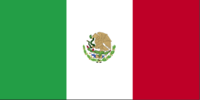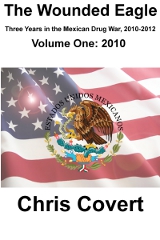Human rights report on Mexico suffers from timing and ignorance

2012-01-24
Posted by: badanov
 For a map, click here
For a map, click hereBy Chris Covert
Human Rights Watch (HRW) issued its annual report on human rights worldwide Sunday, including Mexico, which said the Mexican Army and the legal system routinely violates human rights in the war on drug cartels.
The report focuses on several areas such as military impunity, freedom of expression, human rights defenders and other areas as areas of concern.
Specific in the report is HRW's contention that of almost 5,800 cases of human rights abuses by the military, only 90 have been investigated. The ratio comports correctly to what the two military agencies say are the number of cases in which actual crimes have been involved, or about two percent.
Additionally, the report says that since 2007, 3,671 cases of human rights abuses by the military have been resulted in actual investigations, for which only 15 military have been convicted. That number seems low. The report does, however, say an additional 14 soldiers have been sentenced for crimes committed in the normal course of fighting drug cartels. In the report it is unclear if those 14 are included under the rubric of resolved cases.
One case involving an individual in Apodaca, Nuevo Leon last September was included in the report, that of Gustavo Acosta.
That month there was increased armed gang activity in which several police facilities were attacked by armed suspects in Monterrey metropolitan area. Apodaca is a suburb of Monterrey.
The reports, not surprisingly, fail to give much in the way of detail. Indeed, while this writer covered Monterrey metropolitan area that month, the shooting of Gustavo Acosta by Mexican Marines was not reported or had been missed.
It is important to note that during the first week of last October, following the death of Gustavo Acosta, 157 municipal police agents were detained and tested for their involvement with drug trafficking. It is not hard to see how Gustavo Acosta could have been involved in drug trafficking and did fire a weapon on marine units operating in the area -- drug cartels routinely employ lookouts they term as hawks -- just as it is not hard to see how Gustavo Acosta could have been accidentally shot by marines. In an environment in which drug gangs routinely infiltrate state agencies, information is often lacking or is of poor quality
The Secretaria de Defensa Nacional (SEDENA), the controlling agency for the Mexican Army, is not squeamish about investigating abuses. It remains to be seen how the Gustavo Acosta shooting will turn out with the Secretaria de Marina (SEMAR), the controlling agency for Mexican Naval Infantry.
It is worth noting that the Mexican military have publicly stated their commitment to policing their ranks of those who commit abuses, but that is never enough for the human rights watching agencies who swim in the arcane insistence that not only must every t get crossed, but get crossed their way.
It is also worth noting that drug cartels routinely pay poor citizens -- in cash or in kind -- to lodge complaints against the military when a loss of life or other abuse has taken place. SEMAR chief Admiral Mariano Francisco Saynez Mendoza has said as much, and indeed in Mexican press there have been descriptions of individuals who have been paid to perform such services as protesting the Polica Federal presence in an area, for example.
Naturally, the HRW report does not touch on that little bit of window dressing courtesy of drug cartel operatives, predictably preferring to rake a government institution over the coals for its failings. Government agencies are easier to deal with.
The report also fails to address the fact that many Mexican local human rights groups do not vet their members with any of the vigor the Mexican military vets its own. In such an environment, it would be easy for drug cartels, indeed even for operatives of violent Marxist groups such as Guerrero state's Ejercito Popular Revolucionario (EPR) to infiltrate and create the kind of reports groups such as local human rights watch groups have released to the public in the past.
Perhaps the most irritating aspect of the report is the way HRW redact critical facts in cases it champions.
Rodolfo Montiel and Teodoro Cabrera were two ecologistias working in southern Guerrero in 1999 when they were detained for planting marijuana and for possession of military weapons.
The two were convicted for those crimes and sentenced. Then in 2001, they were released on humanitarian grounds by order of then president Vicente Fox. The convictions, however, were not vacated The two men promptly fled to the US, where they live today.
According to internet reports, in 2011 the Inter-American Court of Human Rights declared the two innocent of their crimes and released a report saying they had been tortured while in military custody.
The report IACHR failed to detail the nature of the torture, nor does any report on the IACHR ruling say if the two actually did the crime for which they were convicted.
The strangest aspect of the case revolves around stories of threats against Montiel and Cabrera. They were ecologistas, according to environmental groups' reports, seeking to defend southern Guerrero from logging, i.e. commercial interests.
If the two ecologistas were indeed threatened, it would not have been by the military, whose involvement was complete when they were by law turned over to local legal authorities. In the past Guerrero state and local officials have been linked to human rights violations. Those violations were part of a war instigated by local Marxist groups who were fighting commercial activities such as logging, and were known to enjoy support in some local communities in southern Mexico, including Guerrero state.
The year 1999 was just one year after the famous encounter at El Charco, which human rights groups claim -- disingenuously -- was a massacre of unarmed farmers. The area at the time was already at hot zone for the Mexican military trying to deal with hostile and armed Marxist groups in the area, as well as drug traffickers.
A lot of information framing the arrest and conviction of Montiel and Cabrera remains shrouded in a penumbra of ecological agenda increasingly favored by human rights organizations, and probably funded by global warming alarmists.
Citizen involvement in righting wrongs is always a good thing in a republic, but the additional dimension of the drug cartels and organized crime, whose economic profits sometime depend on smearing their opponents -- like the drug trade it is an intolerable element in discussions of human rights, and a conversation in which HRW refuses to engage.
The HRW report in its rush to judgement fails to make any distinctions when it attempts to decry human rights violations in Mexico. That rush to judgement is the result of sloppy reporting and dishonest ecological agenda building.



